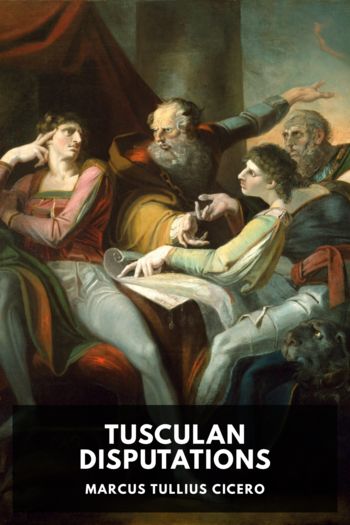Tusculan Disputations, Cicero [good book recommendations TXT] 📗

- Author: Cicero
Book online «Tusculan Disputations, Cicero [good book recommendations TXT] 📗». Author Cicero
But Epicurus, indeed, says such things that it should seem that his design was only to make people laugh, for he affirms somewhere that if a wise man were to be burned or put to the torture … you expect, perhaps, that he is going to say he would bear it, he would support himself under it with resolution, he would not yield to it (and that—by Hercules!—would be very commendable, and worthy of that very Hercules whom I have just invoked): but even this will not satisfy Epicurus, that robust and hardy man! No; his wise man, even if he were in Phalaris’s bull, would say: “How sweet it is! how little do I regard it!” What, sweet? Is it not sufficient if it is not disagreeable? But those very men who deny pain to be an evil are not in the habit of saying that it is agreeable to anyone to be tormented. They rather say that it is cruel, or hard to bear, afflicting, unnatural, but still not an evil. While this man who says that it is the only evil, and the very worst of all evils, yet thinks that a wise man would pronounce it sweet. I do not require of you to speak of pain in the same words which Epicurus uses—a man, as you know, devoted to pleasure. He may make no difference, if he pleases, between Phalaris’s bull and his own bed. But I cannot allow the wise man to be so indifferent about pain. If he bears it with courage, it is sufficient; that he should rejoice in it, I do not expect. For pain is, beyond all question, sharp, bitter, against nature, hard to submit to and to bear. Observe Philoctetes: we may allow him to lament, for he saw Hercules himself groaning loudly through extremity of pain on Mount Oeta. The arrows with which Hercules presented him were then no consolation to him, when
The viper’s bite, impregnating his veins
With poison, rack’d him with its bitter pains.
And therefore he cries out, desiring help, and wishing to die,
Oh that some friendly hand its aid would lend,
My body from this rock’s vast height to send
Into the briny deep! I’m all on fire,
And by this fatal wound must soon expire.
It is hard to say that the man who was obliged to cry out in this manner was not oppressed with evil, and great evil too.
But let us observe Hercules himself, who was subdued by pain at the very time when he was on the point of attaining immortality by death. What words does Sophocles here put in his mouth, in his Trachiniae? who, when Deianira had put upon him a tunic dyed in the centaur’s blood, and it stuck to his entrails, says,
What tortures I endure no words can tell,
Far greater these, than those which erst befell
From the dire terror of thy consort, Jove;
E’en stern Eurystheus’ dire command above;
This of thy daughter, Oeneus, is the fruit,
Beguiling me with her envenom’d suit,
Whose close embrace doth on my entrails prey,
Consuming life; my lungs forbid to play;
The blood forsakes my veins; my manly heart
Forgets to beat; enervated, each part
Neglects its office, while my fatal doom
Proceeds ignobly from the weaver’s loom.
The hand of foe ne’er hurt me, nor the fierce
Giant issuing from his parent earth.
Ne’er could the Centaur such a blow enforce,
No barbarous foe, nor all the Grecian force;
This arm no savage people could withstand,
Whose realms I traversed to reform the land.
Thus, though I ever bore a manly heart,
I fall a victim to a woman’s art.
Assist, my son, if thou that name dost hear,
My groans preferring to thy mother’s tear;
Convey her here, if, in thy pious heart,
Thy mother shares not an unequal part:
Proceed, be bold, thy father’s fate bemoan,
Nations will join, you will not weep alone.
Oh, what a sight is this same briny source,
Unknown before, through all my labors’ course!
That virtue, which could brave each toil but late,
With woman’s weakness now bewails its fate.
Approach, my son; behold thy father laid,
A wither’d carcass that implores thy aid;
Let all behold: and thou, imperious Jove,
On me direct thy lightning from above:
Now all its force the poison doth assume,
And my burnt entrails with its flame consume.
Crestfallen, unembraced, I now let fall
Listless, those hands that lately conquer’d all;
When the Nemaean lion own’d their force,
And he indignant fell a breathless corse;
The serpent slew, of the Lernean lake,
As did the Hydra of its force partake:
By this, too, fell the Erymanthian boar:
E’en Cerberus did his weak strength deplore.
This sinewy arm did overcome with ease
That dragon, guardian of the golden fleece.
My many conquests let some others trace;
It’s mine to say, I never knew disgrace.31
Can we then, despise pain, when we see Hercules himself giving vent to his expressions of agony with such impatience?
Let us see what Aeschylus says, who was not only a poet but a Pythagorean philosopher also, for that is the account which you have received of him. How does he make Prometheus bear the pain he suffered for the Lemnian theft, when he clandestinely stole away the celestial fire and bestowed it on men, and was severely punished by Jupiter for the theft? Fastened to Mount Caucasus, he speaks thus:
Thou heav’n-born race of Titans here fast bound,
Behold thy brother! As the sailors sound
With care the bottom, and their ships confine
To some safe shore, with anchor and with line;
So, by Jove’s





Comments (0)